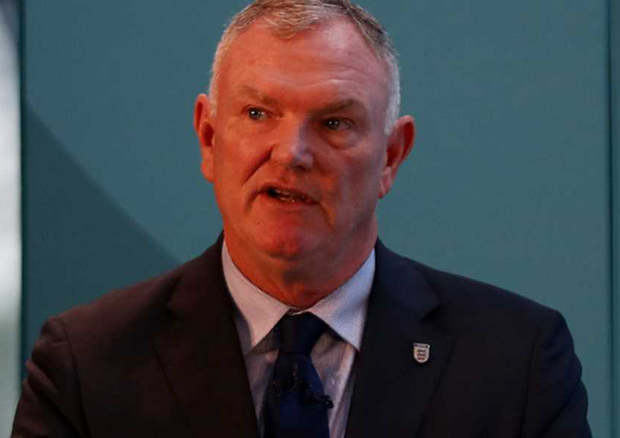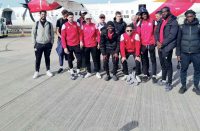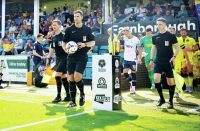Pic: TheFA.com
THE Football Association and The Non-League Paper have teamed up to bring you a series of exclusive columns and features. Chairman Greg Clarke kicks us off this week, with his views on Non-League football, the FA Cup and the hallowed turf.
The Non-League Pyramid is a truly unique system in the whole of world football. One of the strengths that first impressed me when I was chairman of the English Football League was how competitive the Conference sides – before it became the Vanarama National League – were when they got promoted.
It’s not like the other end of football, where Championship sides would often struggle when they were promoted into the Premier League. National League sides get promoted and largely do very well.
That’s symptomatic of how competitive the football is. Anyone who saw Sutton United last Monday night against Arsenal will know that very well, especially when Roarie Deacon rattled the bar. They had some chances, they were in the game and really gave Arsenal a run for their money.
Probably two thirds of the games I watch are Non-League – and I’ve been up and down the Pyramid. I was at Hamworthy United a couple of weeks ago watching the game with around 150 other people. I
t was the only game around for miles that day. Everyone else had been frozen off, but Hamworthy were on because they have an artificial pitch. It was a great game.
The whole Pyramid is well organised and competitive – it’s a great credit to English football. Earlier this season I was at Egham Town for their FA Cup game against St Albans City.
Enthusiasts
The usual crowd at The Runnymeade Stadium is about 90, but on that day there was over 300 and the atmosphere was brilliant. They gave me a really warm welcome there, but I got a surprise when I met the chairman.
He said: ‘Do you know how we stay afloat? Come around here’. There was a huge shed around the corner. I assumed it was a bar or a clubhouse. He said: ‘No, no. It’s a DIY warehouse we built – we sell bathrooms and kitchens!’
People and clubs will do what they have to keep their clubs going. I meet so many lovely people on my travels – they’re all enthusiasts for the game.
I try to get down early so I can have a walk around the ground and see their facilities. I meet the youth teams, go to the referee’s room for a chat. It’s a whole experience.
Getting out and speaking to people is a very important part of my role as FA chairman. I got around to all the County FAs before Christmas and tried to take in a game.
I went to Devon and saw the Devon County FA representative side play the Navy. You talk to the committees, you meet the volunteers, have a chat with the groundsman and the ref, speak to the two teams – it gives you a feel for what’s important and the vibrancy of the game. It bases you in reality rather than what you read in reports.
Another place I made the trip to was Carlisle to visit the Cumberland and Westmorland FAs. The area was devastated two years ago by the floods.
They showed me one of their huge facilities where about 15 grass and artificial grass pitches had been flooded. The building that housed all the changing facilities had also taken a big hit. The ground floor, made of wood, had been forced up to the ceiling by the pressure of the water.
Unless you go to places like that to see the damage and how they’re trying to recover, you don’t realise what people have to deal with.
We live in a world of change. Work patterns are changing, so are family patterns, the nuclear family is a thing of the past. But football is still a cohesive force in society that still brings people together.
I stood at Barnes Common recently watching Stonewall, one of our most successful LGBT clubs. I watched the game and met the team after to talk about the issues surrounding coming out as a gay footballer.
We went to a pub around the corner for a beer after, and the interesting thing was that only seven out of the starting XI are gay. They said: ‘They’re our mates so we come to play football with them’. It’s a real example of how football brings people together.
There’s also a good alliance between the FA, the County FAs, the Premier League, the Football League and all the trusts and charities.
We had a terrible event recently where James Moorfoot died in an amateur game playing for Langtoft AFC. Our thoughts are with James’ family and friends as well as everyone at the club.
It’s particularly in times like this we must stand together. The professional game was able to provide counselling for the people who were there when it happened. The game does work hard to support each other. We have shared values.






















I agree the Non League ,is the HEARTBEAT OF OUR GAME. Sadly the F.A. and its associates, leave the Non League Game Wanting.
Whilst the Premier League , its Multi Million Pound Players, their Managers, and Staff, are AWASH with funding, I see very little evidence, of enough Money making its way to the Heartbeat of our game.
I watch the Heartbeat of our game , week in and week out. I see the under funding on a massive scale .. Poor Facilities. Players Amenities,(the lack of them). Folk working tirelessly to assist their Clubs, with no Payment.
Its Heart breaking, Many clubs could continue functioning for Seasons , On the equivalent of a Premier League players Wage , for only one Month, or in some cases One Week.. I listen to the Pundits, the Games Big wigs, Telling us all about The Grass Roots of our game. How without it we would have nothing, without it.
Well… as a Heartbeat of our Game Fan. I can Honestly say. In the very Near Future, The Heart will stop Beating.Its on its knees ..Mr Clark please take stock now, F.A. please take note.Thankyou.